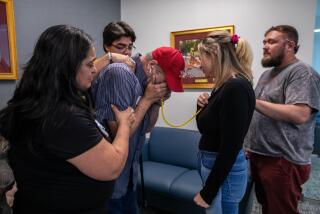Transplant centers penalized
Hoping to send a warning to organ transplant centers nationwide, the federal government said Tuesday that it would pull funding from two heart programs that failed to meet its minimum performance standards. A third center agreed to forgo federal money under pressure.
The unusual actions by the U.S. Centers for Medicare and Medicaid Services followed a June report in The Times that a fifth of the 236 federally funded heart, liver and lung transplant centers had subpar patient survival or performed too few operations to ensure competency.
Dr. Barry Straube, Medicareâs chief medical officer, likened his agencyâs previous enforcement efforts to that of a highway patrol that never stopped a speeding car.
âPeople tend to ignore the lawâ if no one is watching, Straube said. âOnce you get the highway patrol out to stop a few cars very visibly, then people will tend to slow down.â
The Medicare agency sent letters Tuesday notifying the small heart transplant programs at Wake Forest University Baptist Medical Center in North Carolina and Montefiore Medical Center in New York that they would lose their funding. They have 30 days to challenge the action, Straube said.
Faced with the same threat, St. Louis University Hospital agreed to withdraw its small heart transplant program from the Medicare program.
Reviews of other poorly performing transplant programs are underway, and Straube suggested that more could lose federal backing. Without federal support, it can be difficult for a transplant center to secure private insurance contracts or even stay open.
The governmentâs action could force poorly performing programs to improve or drop out of Medicare, Straube said.
âIt might be possible that people were not taking this seriously enough and thinking that we would not take this action,â he said.
Some transplant experts said the federal government should be acting against many more centers and called Tuesdayâs move long overdue.
âItâs about time,â said Dr. Mark L. Barr, past president of the International Society for Heart and Lung Transplantation and a cardiothoracic transplant surgeon at USC.
The poor performance of many transplant centers is no secret.
For its June report, The Times examined the total number of transplants performed in 2005 by each Medicare-approved center, as well as survival statistics made public in January by government-funded transplant researchers.
All of the information is available on the websites of the United Network for Organ Sharing and the Scientific Registry of Transplant Recipients.
The three programs identified Tuesday failed to perform the minimum number of surgeries the federal government set to keep skills sharp. Montefiore and St. Louis University performed no heart transplants last year, and Wake Forest did only two. The federal standard is 12.
Wake Forestâs one-year patient survival rate also was far below the federal requirement of 73%, hitting a recent low of 43%.
Two other programs identified by The Times -- one in Virginia, the other in Illinois -- have voluntarily left the Medicare program and shut down since June because of declining patient volumes.
Wake Forest Baptist spokesman Mark Wright said transplant officials would meet this week to discuss their next steps. âWe have invested a tremendous amount of resources in our heart transplant program,â he said. âWe feel it is a viable program.â
Likewise, a spokesman for Montefiore said it âvery definitelyâ plans to continue its heart program.
Steven Osborne said the program had a couple of lean years after a surgeon left but now has hired âa great team of true nationally recognized expertsâ to rebuild it.
St. Louis University hospital spokeswoman Laura Signaigo also said the heart transplant program would remain open without its Medicare patients.
In an e-mail, she attributed the decreased number of transplants to the âsuccess of other medical and surgical therapies for advanced heart failure.â
The Timesâ report in June found that although many of the substandard programs treated small numbers of patients, their collective failings carried a significant toll.
Nine lung programs, for example, failed to meet the minimum Medicare standards for survival, number of surgeries or both. Those hospitals accounted for 21 more deaths than would be expected, based on the government-funded analysis released in January of how all patients fare nationwide within a year of surgery. It is adjusted for the condition of the patients and the organs.
Three dozen heart transplant programs didnât meet federal standards for survival or volume. They accounted for 43 more deaths than expected, based on the January analysis. Altogether, the heart programs examined by The Times had 71 more patients die than expected within a year of transplant.
Medicareâs survival and volume benchmarks vary by organ, and there are none for kidney transplants.
The agency stepped up its scrutiny only after The Times began asking detailed questions earlier this year. In March, the agency sent letters to all its approved programs, asking for information about their staffing and performance.
Then in August, Medicare sent letters to about 35 underperforming centers, giving them another chance to prove their quality before taking enforcement actions against them.
The Medicare agency said it is finalizing a new set of rules, due out this year, to govern transplant programs.
*






